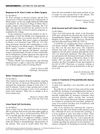 1 citations,
April 2019 in “Acta Medica Philippina”
1 citations,
April 2019 in “Acta Medica Philippina” Azathioprine may help treat severe alopecia areata, but more research is needed.
 December 2024 in “Tropical Journal of Natural Product Research”
December 2024 in “Tropical Journal of Natural Product Research” CTUMP's Herb shampoo promotes faster and denser hair growth.
 9 citations,
October 2018 in “Elsevier eBooks”
9 citations,
October 2018 in “Elsevier eBooks” Nanotechnology is improving drug delivery and targeting, with promising applications in cancer treatment, gene therapy, and cosmetics, but challenges remain in ensuring precise delivery and safety.
 January 2017 in “Acta dermato-venereologica”
January 2017 in “Acta dermato-venereologica” The congress showed that psychological therapy can help skin condition patients, social media affects acne stigma, education improves atopic dermatitis, and patient satisfaction in dermatology is high, especially with good doctor engagement.
 31 citations,
September 2014 in “International Journal of Dermatology”
31 citations,
September 2014 in “International Journal of Dermatology” Anthralin is effective for psoriasis and alopecia with minimal systemic side effects but can irritate the skin.
 9 citations,
January 2015 in “Springer eBooks”
9 citations,
January 2015 in “Springer eBooks” The document concludes that managing PCOS involves treating symptoms, regulating periods, and reducing health risks, with specific medications for fertility and metabolic issues.
 5 citations,
May 1999 in “Dermatologic Surgery”
5 citations,
May 1999 in “Dermatologic Surgery” Lasers can effectively treat pseudofolliculitis barbae, but insurance often doesn't cover it, possibly due to racial bias.
 3 citations,
October 2019 in “Pharmaceutics”
3 citations,
October 2019 in “Pharmaceutics” New technique implants pigment in scalp with less pain and damage.
 54 citations,
May 2018 in “International journal of risk & safety in medicine”
54 citations,
May 2018 in “International journal of risk & safety in medicine” Antidepressants, 5α-reductase inhibitors, and isotretinoin can cause long-lasting sexual dysfunction.
3 citations,
November 2022 in “Molecules/Molecules online/Molecules annual” The substances improved hair regrowth and protected hair cells in humans and mice.
 February 2024 in “International Journal of Molecular Sciences”
February 2024 in “International Journal of Molecular Sciences” Hair loss in Androgenetic Alopecia is caused by genetics, aging, and lifestyle, leading to hair follicle shrinkage and related health risks.
 2 citations,
July 2023 in “Frontiers in Endocrinology”
2 citations,
July 2023 in “Frontiers in Endocrinology” The review found that current care models for PCOS are not fully effective and more research is needed, especially in low-income countries.
August 2024 in “Nutrients” Probiotics help reduce hair loss and increase hair growth in people with androgenic alopecia.
13 citations,
April 2021 in “Value in Health” There is a significant need for better-validated quality of life tools in dermatology.
Different types of sun exposure damage skin cells and immune cells, with chronic exposure leading to more severe and lasting damage.
 11 citations,
November 2017 in “Hong Kong Medical Journal”
11 citations,
November 2017 in “Hong Kong Medical Journal” Polycystic ovary syndrome increases the risk of diabetes, heart disease, and endometrial cancer, and requires early treatment to manage these risks.
 13 citations,
July 2019 in “Pediatric dermatology”
13 citations,
July 2019 in “Pediatric dermatology” Pediatric dermatologists need to understand the unique skin health needs of LGBTQIA youth to provide better care.
61 citations,
January 2002 in “American Journal of Clinical Dermatology”  5 citations,
January 2015 in “Evidence-based complementary and alternative medicine”
5 citations,
January 2015 in “Evidence-based complementary and alternative medicine” Adding licorice gel to laser treatment is more effective for reducing facial hair than laser alone.
1 citations,
June 2004 in “Sexuality, reproduction & menopause” Eflornithine cream effectively reduces facial hair in women with hirsutism.
 11 citations,
January 2018 in “RSC Advances”
11 citations,
January 2018 in “RSC Advances” Cedrol cream is more effective and safe for promoting hair growth than traditional treatments.
 3 citations,
July 2022 in “Journal of the American Academy of Dermatology”
3 citations,
July 2022 in “Journal of the American Academy of Dermatology” Facial hair is crucial for transgender men's gender identity and transition.
 16 citations,
June 2008 in “Springer eBooks”
16 citations,
June 2008 in “Springer eBooks” Over 50% of women over 50 experience hair loss, with minoxidil being the only proven effective treatment.
 5 citations,
January 2020 in “Skin Research and Technology”
5 citations,
January 2020 in “Skin Research and Technology” Minoxidil 5% works better than 2% for hair growth in male-patterned hair loss.
9 citations,
June 2019 in “JAAD case reports” Laser hair removal can help treat acne keloidalis nuchae, but results vary and a standard scoring system is needed.
 41 citations,
February 2001 in “Current pharmaceutical design”
41 citations,
February 2001 in “Current pharmaceutical design” Current and future treatments for alopecia areata focus on immunosuppression, immunomodulation, and protecting hair follicles.
 22 citations,
November 2018 in “Brazilian Journal of Pharmaceutical Sciences”
22 citations,
November 2018 in “Brazilian Journal of Pharmaceutical Sciences” New physical methods like electrical currents, ultrasound, and microneedles show promise for improving drug delivery through the skin.
 16 citations,
January 2013 in “Indian Journal of Dermatology, Venereology and Leprology”
16 citations,
January 2013 in “Indian Journal of Dermatology, Venereology and Leprology” New treatments and early diagnosis methods for permanent hair loss due to scar tissue are important for managing its psychological effects.
 53 citations,
April 2018 in “Journal of The American Academy of Dermatology”
53 citations,
April 2018 in “Journal of The American Academy of Dermatology” Cancer treatments often cause hair disorders, significantly affecting patients' quality of life, and better management methods are needed.
 November 2024 in “Pharmaceutics”
November 2024 in “Pharmaceutics” Transfersomes are better than liposomes for targeting hair follicles in alopecia treatment.























